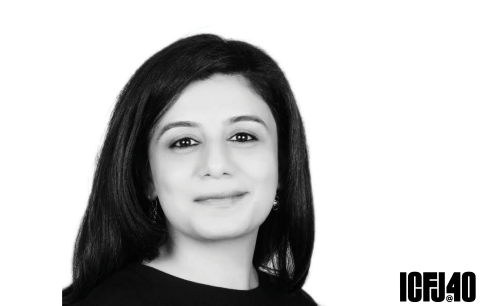This year, ICFJ is celebrating our 40th anniversary and our long history of supporting journalists. Throughout the year, we will be showcasing network members from around the world.
Former ICFJ Knight Fellow Anubha Bhonsle is an Indian journalist whose career has focused on developing new kinds of storytelling. Based in Delhi, Bhonsle has led groundbreaking initiatives related to gender and sanitation. She’s the founder of Newsworthy.Studio, and covers India, the Global South, current affairs, gender, climate adaptation and rights.
This interview has been edited slightly.

How have you been involved with ICFJ over the years?
I was an ICFJ Knight Fellow based in India. I started towards the end of 2017 and continued for a year and half. I worked with legacy and new media newsrooms, incubating digital products that allowed for better, multi-format and intersectional coverage on gender, water and rights.
At The Indian Express, I led #GenderAnd, at The Wire, I started #Grit and for Jagran New Media, I helped disseminate and build content pipelines around their product on water – Jal Jagran.
In all newsrooms, I kept intersectional coverage at the core and built coverage, social media calendars, design frameworks, dissemination plans, events and partnerships around it, mostly working with in-house teams and support from ICFJ fellows and associates.
What was the biggest outcome from participating in the program?
My years at ICFJ sowed the seeds for my entrepreneurial venture – a social impact communications agency called Newsworthy.Studio. Founded in 2019, Newsworthy.Studio is a trademarked initiative of Sumud Media, to fill the gaps between content, communication, communities and change.
Our social publishing news and current affairs feed, Newsworthy with Anubha Bhonsle, provides succinct information on vital national and global events. We have been able to create a new grammar for news-focused storytelling and consumption – one that prides itself in news not noise, context not conflict, and information that is worthy of people's time and attention.
I was able to step away from traditional formats of storytelling and fine-tune the design, information stacking, language, tonality of this feed. In many ways my time at ICFJ and interaction with the ICFJ fellows from across the globe played a role, as we all deliberated on how to make consuming news information less of a chore!
At Newsworthy.Studio, the social impact consultancy that I founded, I took my years as the executive editor of CNN-IBN and my interactions with C-suite executives of legacy and digital media newsrooms (as an ICFJ fellow) and built an ideas- and content-led company that allows organizations to do compelling storytelling around issues that matter to them, and build audiences/communities.
Our work powers the storytelling and strategy of a whole host of global organizations and purpose-led brands, all of whom have a mission to accelerate social impact. The learning in many ways was to not see work in silos or as one-dimensional, plus meet audiences where they were.
It is through our work at Newsworthy.Studio that we have been able to incubate Climate Change Explainers, a multimedia project on reproductive rights, work on advocating women leadership in healthcare, as well as envision what an empowered Global South could look like.
There are many other examples that I would love for journalists, researchers and illustrators to explore on the opportunities that lie at the intersection of storytelling, research and design.
Why is it so important right now to provide the kind of support to journalists that ICFJ does, especially in South Asia and/or on the issues you work on?
Journalists, particularly in the Global South, need sustained support and attention to build on ideas relevant to their landscapes and the audiences they serve. These ideas do have global resonance but need to be voiced, stamped and foreground by Global South journalists. This needs a slightly different approach and one that ICFJ has a proven track record in having worked in Africa, Latin America and more. I personally do feel there is a need to further broad-base and scale what ICFJ teaches in terms of thinking, ideation, formats, products and tools.
What’s one piece of advice you’d give to an aspiring journalist?
Learn new tools, frameworks, ideas. Document your work, thoughts, ideas, reporting.